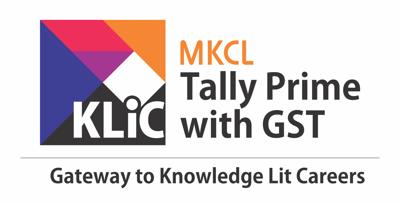- In this course, you will learn to:
- Define the fundamental concepts and utility of accounting, emphasizing its role in business
- Identify various methods of accounting and understand their application in financial reporting
- Organize basic books of accounts and summarize the process of recording financial transactions
- Demonstrate the setup and navigation in Tally Prime, illustrating its importance in modern accounting
- Compare Tally ERP 9 and Tally Prime, highlighting the advancements in the latter
- Categorize and assemble different features within Tally Prime focusing on accounting, inventory, and taxation
- Examine and report on the creation and management of company data within Tally Prime
- Differentiate and organize voucher types and chart of accounts for efficient financial management
- Predict and analyze financial outcomes using multi-master features in Tally to preview financial statements
- Operate and modify accounting vouchers emphasizing receipt and payment transactions in Tally Prime
- Find and apply advanced accounting and inventory voucher configurations for comprehensive financial tracking
- Distinguish between various specialized voucher types, understanding their specific uses and implications in accounting
- Estimate financial standings and rate business performance through detailed financial statement analysis in Tally Prime

Fundamentals of Accounting and Introduction to Tally Software
Understand core accounting concepts and get introduced to using Tally for business accounting.
KLiC Certificate in Fundamentals of Accounting and Introduction to Tally Software
Introduction
What you'll learn ?
- At the end of this course, learners will be able to:
- Interpret the key concepts and significance of accounting in the business context to understand its foundational importance
- Illustrate different accounting methodologies and their relevance to financial accuracy and compliance
- Paraphrase the steps involved in organizing basic books of accounts and the process for recording financial transactions
- Demonstrate proficiency in using Tally Prime for accounting tasks showcasing effective setup and navigation skills
- Compare the features and functionalities of Tally ERP 9 and Tally Prime to identify improvements and enhancements
- Construct company profiles within Tally Prime incorporating essential accounting, inventory, and taxation details
- Report on the systematic approach to creating, managing, and analyzing company data within Tally Prime
- Categorize various voucher types and chart of accounts in Tally Prime, establishing organized financial management practices
- Predict financial outcomes and appraise business performance through advanced features in Tally for financial statement analysis
- Utilize different types of accounting vouchers in Tally Prime, focusing on accurate receipt and payment transaction recording
- Experiment with and apply advanced configurations for accounting and inventory vouchers in Tally Prime for detailed financial tracking
- Differentiate and assess the implications of specialized voucher types, understanding their roles in complex accounting practices
- Estimate and judge business performance and financial health by analyzing comprehensive financial statements within Tally Prime
Syllabus
- Definition & Utility of Accounting
- Introduction to Accounting
- Method of Accounting
- Financial Accounting Concept
- Basic Books of Accounts
- Recording Financial Transactions
- Manual Accounting System
- Financial Reports under Accounting
- History of Tally
- Importance of Tally in accounting
- Tally ERP 9 Vs Tally Prime
- Tally Prime Setup - Download
- Tally Prime Setup - Installation
- Tally License Information
- Tally Prime Interface - Select Company
- Tally Prime Interface - Manage Options - Other Buttons
- Tally Prime Interface - Manage Options - F1 Help Button
- Company Creation in Tally Prime - I
- Company Creation in Tally Prime - II
- Company Feature in Tally Prime - Accounting Feature
- Company Feature in Tally Prime - Inventory Feature
- Company Feature in Tally Prime - Taxation & Other Feature
- Gateway of Tally Introduction - Menu Options - I
- Gateway of Tally Introduction - Menu Options - II
- Gateway of Tally Introduction - Main Screen - I
- Gateway of Tally Introduction - Main Screen - II
- Accounting Group Introduction
- Accounting Group & Sub Group Creation I
- Accounting Group & Sub Group Creation II
- Accounting Group & Sub Group Alteration/Deletion
- Accounting Ledger Introduction
- Accounting Ledger Creation - I
- Accounting Ledger Creation - II
- Accounting Ledger Creation - III
- Accounting Ledger Alteration/Deletion
- Stock Group Introduction
- Stock Group Creation
- Stock Group Alteration / Deletion
- Stock Category Introduction
- Stock Category Creation
- Stock Category Alteration / Deletion
- Unit of Measurement Introduction
- Unit of Measurement Creation - Simple & Compound
- Unit of Measurement Alteration/Deletion
- Godown Introduction
- Godown Vs Location
- Godown and Location Creation
- Godown Location, Alteration/Deletion
- Stock Item Introduction
- Stock Item Creation
- Stock Item Alteration/Deletion
- Voucher Types in Tally Introduction
- Voucher Types Creation/Alteration in Tally Prime
- Chart of Accounts in Tally Prime
- Chart of Accounts - Accounting Groups
- Chart of Accounts - Accounting Ledgers
- Chart of Accounts - Voucher Types
- Chart of Accounts - Inventory Masters
- Multi Accounting Master - Introduction
- Multi Accounting Master - Creation
- Multi Accounting Master Alteration
- Multi Inventory Master - Introduction
- Multi Inventory Master - Creation
- Multi Inventory Master Alteration
- Preview of Trial Balance with Master Opening
- Preview of Profit & Loss Statement
- Preview of Balance Sheet with Master Opening
- Treatment of Opening Balance Difference
- Basic Accounting Vouchers used for business Transaction
- Receipt Transaction in Tally Prime - Configuration
- Receipt Transaction in Tally Prime - Booking
- Receipt Transaction in Tally Prime - Cash Receipt
- Receipt Transaction in Tally Prime - Bank Receipt
- Payment Transaction in Tally Prime - Configuration
- Payment Transaction in Tally Prime - Booking
- Payment Transaction - Petty Cash Expenses
- Payment Transaction - Online Payment
- Payment Voucher
- Receipt Voucher
- Contra Voucher Configuration
- Contra Voucher - Cash Deposit
- Contra Voucher - Interbank Transfer
- Receipt Voucher as Contra Voucher
- Payment Voucher as Contra Voucher
- Journal Voucher - Depreciation
- Journal Voucher - Other transaction
- Cash Bank Books and Trial Balance Reports
- Cash Purchase Transaction - Configuration
- Cash Purchase Transaction - Account Invoice
- Cash Purchase Transaction - Voucher Format
- Credit Purchase Transaction - Account Invoice
- Credit Purchase Transaction - Voucher Format
- Cash Sales Transaction - Configuration
- Cash Sales Transaction - Account Invoice
- Credit Sales Transaction - Account Invoice
- Credit Sales Transaction - Voucher Format
- Inventory Cash Purchase - Configuration
- Inventory Cash Purchase - Transaction
- Inventory Credit Purchase
- Inventory Credit Purchase with Delivery Charges
- Inventory Cash Sales - Bank Account
- Inventory Cash Sales - Cash Ledger
- Inventory Credit Sales
- Inventory Credit Sales with Delivery Charges
- Debit Note Voucher
- Credit Note Voucher
- Stock Journal - Material Transfer
- Stock Journal - Material Consumption
- Physical Stock
- Memorandum Voucher
- Optional Voucher Configuration
- Optional Voucher Performa Invoice
- Financial Statements
- Accessing Trial Balance Report
- Working with Trial Balance in Tally
- Accessing Profit & Loss Account Report
- Working with Profit and Loss Report in Tally
- Accessing Balance Sheet Report
- Working with Balance Sheet Report in Tally
- Accessing Stock Summary Report
- Working with Stock Summary Report
- Cash & Funds Flow Statements
- Day book & Trial Balance Report
- Cancellation, Alteration and Deletion of Vouchers
- Addition & Insertion of Transaction in Tally Prime
- Printing & Exporting Vouchers
- Columnar Sales Register
- Columnar Purchase Register
- Cash & Bank Books in Tally Prime
- Edit Log in Tally Prime
Certificate
- MKCL provides certificate (for 30/60/90 hours courses) to the KLiC learner after his/her successful course completion.
Academic Approach
The Academic Approach of the course focuses on the “work centric” education i.e. begin with work (and not from a book !), derive knowledge from work and apply that knowledge to make the work more wholesome, useful and delightful. The ultimate objective is to empower the Learner to engage in socially useful and productive work. It aims at leading the learner to his/her rewarding career as well as development of the society.
Learning methodology
- Learners are given an overview of the course and its connection to life and work.
- Learners are then exposed to the specific tool(s) used in the course through the various real-life applications of the tool(s).
- Learners are then acquainted with the careers and the hierarchy of roles they can perform at workplaces after attaining increasing levels of mastery over the tool(s).
- Learners are then acquainted with the architecture of the tool or Tool Map so as to appreciate various parts of the tool, their functions and their inter-relations.
- Learners are then exposed to simple application development methodology by using the tool at the beginner’s level
- Learners then perform the differential skills related to the use of the tool to improve the given ready-made outputs.
- Learners are then engaged in appreciation of real-life case studies developed by the experts.
- Learners are then encouraged to proceed from appreciation to imitation of the experts.
- After imitation experience, they are required to improve the expert’s outputs so that they proceed from mere imitation to emulation.
- Finally, they develop the integral skills involving optimal methods and best practices to produce useful outputs right from scratch, publish them in their ePortfolio and thereby proceed from emulation to self-expression.
Evaluation Pattern
Evaluation Pattern of KLiC Courses consists of 4 Sections as per below table:
| Section No. | Section Name | Total Marks | Minimum Passing Marks |
|---|---|---|---|
| 1 | Learning Progression | 25 | 10 |
| 2 | Internal Assessment | 25 | 10 |
| 3 | Final Online Examination | 50 | 20 |
| Total | 100 | 40 | |
| 4 | SUPWs (Socially Useful and Productive Work in form of Assignments) | 5 Assignments | 2 Assignments to be Completed & Uploaded |
MKCL’s KLiC Certificate will be provided to the learner who will satisfy the below criteria:
- Learners who have successfully completed above mentioned 3 Sections i.e. Section 1, Section 2 and Section 3
- Additionally, learner should have completed Section 4 (i.e. Section 4 will comprise of SUPWs i.e. Socially Useful and Productive Work in form of Assignments)
- Learner has to complete and upload minimum 2 out of 5 Assignments
Courses Fee Structure from 01 July, 2025 Onwards
KLiC 30 hour course fee applicable from 01 July, 2025 all over Maharashtra| KLiC Course Duration | MFO: MKCL Share (Including 18% GST) |
ALC Share (Service Charges to be collected by ALC) |
|---|---|---|
| 30 hours | Rs. 300/- | Rs. 1,500/- |
Important Points:
* Above mentioned fee is applicable for all Modes of KLiC Courses offered at Authorised Learning Center (ALC) and at Satellite Center
* Total fee is including of Course fees, Examination fees and Certification fees
* MKCL reserves the right to modify the Fee anytime without any prior notice
* Above mentioned fee is applicable for all Modes of KLiC Courses offered at Authorised Learning Center (ALC) and at Satellite Center
* Total fee is including of Course fees, Examination fees and Certification fees
* MKCL reserves the right to modify the Fee anytime without any prior notice
